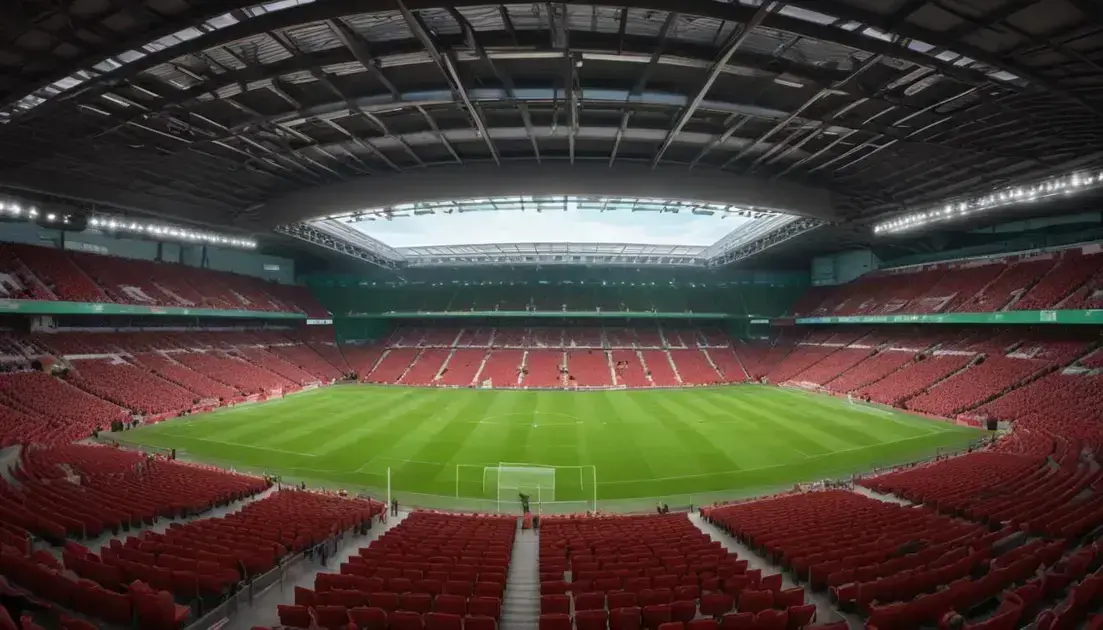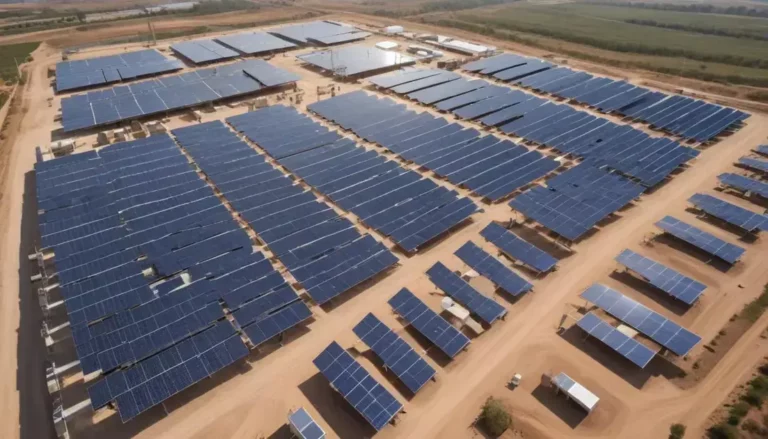Liverpool FC’s Innovative Approach to DAC and Carbon Credits
Direct Air Capture (DAC) is a technology that actively removes carbon dioxide from the atmosphere, significantly contributing to climate change mitigation efforts by providing a scalable solution for reducing greenhouse gas emissions.
DAC technology is revolutionizing how football clubs address their carbon footprint. Join us as we explore Liverpool FC’s pioneering efforts in sustainability.
What is Direct Air Capture (DAC)?
Direct Air Capture (DAC) is an innovative technology aimed at mitigating climate change by removing carbon dioxide directly from the atmosphere. It works by using large fans to draw ambient air into a facility. The air then passes through a chemical solution or filter that captures the CO₂, allowing it to be safely stored or utilized.
The Importance of DAC lies in its potential to significantly reduce greenhouse gas concentrations. As global temperatures rise, conventional methods of emission reduction may not be sufficient. DAC offers a proactive approach to not only stabilize but also actively lower atmospheric CO₂ levels.
One of the key advantages of DAC is its flexibility. Facilities can be established in various locations, including urban areas, without relying strictly on proximity to emission sources. This allows for broader implementation across different regions. Furthermore, advancements in technology continue to enhance the efficiency and effectiveness of DAC systems, making them more viable for large-scale deployment.
Despite its promise, DAC also faces challenges, particularly regarding energy consumption and cost. Ensuring that the energy used for DAC processes comes from renewable resources is crucial for maximizing its environmental benefits. Ongoing research and collaboration between industries and governments will help address these issues, paving the way for a sustainable future.
Liverpool FC’s Partnership with 1PointFive
Liverpool FC’s partnership with 1PointFive marks a significant step in the club’s commitment to sustainability and combating climate change. This collaboration aims to integrate Direct Air Capture (DAC) technology into the football club’s operations. By leveraging DAC, the club seeks to actively reduce its carbon footprint while setting a precedent for others in the sports industry.
Through this partnership, Liverpool FC will invest in the development of DAC facilities that efficiently remove carbon dioxide from the atmosphere. 1PointFive, a leader in advancing DAC solutions, provides the expertise necessary for this initiative. The club not only aims to achieve carbon neutrality but also aspires to educate fans and the wider community about the importance of sustainable practices.
The financial implications of this initiative are as important as the environmental benefits. By adopting cutting-edge technologies, Liverpool FC seeks to position itself as a forward-thinking organization that prioritizes innovation. The collaboration is seen as part of a broader movement in sports to address climate issues and engage with fans on ecological matters.
As Liverpool FC charts its path, the partnership with 1PointFive serves as a vital component of the club’s long-term sustainability strategy, inspiring other organizations to invest in similar environmental solutions.
Understanding Carbon Credits
Carbon credits are essential tools in the fight against climate change. They represent a permit that allows the holder to emit a certain amount of carbon dioxide or other greenhouse gases. For every ton of CO₂ emitted, one carbon credit is allocated. This creates a market-driven approach to reducing overall emissions.
Entities like companies or governments can earn carbon credits by implementing projects that reduce greenhouse gas emissions, such as renewable energy installations or reforestation initiatives. These credits can then be bought, sold, or traded, providing a financial incentive for organizations to lower their carbon footprints. The market for carbon credits has grown significantly, reflecting the increasing awareness of environmental responsibility.
One of the primary goals of carbon credits is to facilitate a robust mechanism for emissions reduction. By capping emissions and allowing trading, carbon markets create a flexible system that encourages innovation. This dynamic encourages businesses to find cost-effective methods to reduce emissions, contributing to overall sustainability goals.
Despite their advantages, carbon credits can be complex and occasionally controversial. Critics argue about the effectiveness of carbon trading schemes and the potential for “greenwashing.” Nonetheless, understanding carbon credits is vital for engaging in climate action and supporting sustainable practices globally.
The Impact of DAC on Climate Change
Direct Air Capture (DAC) technology has a profound impact on climate change mitigation efforts. By removing carbon dioxide directly from the atmosphere, DAC addresses one of the most significant contributors to global warming. Unlike traditional methods that focus on reducing emissions at the source, DAC actively extracts CO₂, providing a crucial tool in the battle against climate change.
One of the primary advantages of DAC is its scalability. It can be implemented in various locations, allowing for flexibility in tackling local and global emissions challenges. This technology permits the production of carbon-negative fuels and supports industries in achieving compliance with increasingly strict regulations aimed at reducing overall carbon footprints.
Moreover, DAC systems can be powered by renewable energy sources, making them more sustainable than fossil fuel-based solutions. This potential for integration with green energy further amplifies their overall effectiveness in promoting a cleaner atmosphere.
Despite the benefits, DAC is not without challenges. High operational costs and energy requirements are ongoing concerns that need addressing. Continued innovation and investment in DAC technologies are essential to enhance efficiency and reduce expenses. Ultimately, the implementation of DAC could play an instrumental role in achieving global climate goals, emphasizing the urgent need for widespread adoption.
Liverpool FC’s Sustainability Goals
Liverpool FC has set ambitious sustainability goals aimed at reducing its environmental impact and promoting eco-friendly practices. Recognizing the importance of acting on climate change, the club is focused on becoming a leader in sports sustainability. These goals include achieving carbon neutrality across all operations by a specific target year.
To reach its sustainability goals, Liverpool FC is integrating innovative technologies such as Direct Air Capture systems, which actively remove carbon dioxide from the atmosphere. This initiative not only targets emissions from their facilities but also educates fans about climate issues and the need for responsible practices.
The club plans to enhance energy efficiency in its stadium by implementing renewable energy sources. Solar panels and energy-saving systems are part of a broader strategy to minimize energy consumption and reliance on fossil fuels. Enhancing waste management programs to promote recycling and composting is also on the agenda, further driving the club’s commitment to sustainability.
Liverpool FC intends to collaborate with local communities and stakeholders to build a more sustainable future. By inspiring fans and organizations, the club aims to create a ripple effect of positive environmental changes, proving that sports can play a significant role in addressing global challenges.
Broadening the Scope of Sustainability in Sports
Broadening the scope of sustainability in sports has become essential as organizations recognize their environmental impact and social responsibilities. Sports teams and governing bodies are now implementing sustainable practices across various levels, understanding that their influence extends beyond the field.
Collaborations between sports clubs and environmental organizations are growing, aiming to promote awareness and actionable solutions. These partnerships can lead to innovative initiatives, such as community-based recycling programs, water conservation efforts, and educational workshops focusing on sustainability.
In addition, the use of sustainable materials for merchandise, equipment, and stadium construction reflects a commitment to eco-friendly practices. Many sports organizations are exploring options like recycled materials and energy-efficient designs to minimize their environmental footprint.
Furthermore, fan engagement is critical in driving sustainability efforts. By involving fans through campaigns that encourage responsible behavior, teams can foster a culture of environmental consciousness. This communal approach enhances the connection between the organizations and their supporters, while also promoting eco-friendly initiatives.
As sustainability in sports continues to evolve, it sets a precedent for other industries to follow. By embracing comprehensive sustainability strategies, the sports world can take a leading role in motivating global environmental change and inspiring fans to adopt more responsible practices.
In Summary, Embracing Sustainability in Sports
The journey toward sustainability in sports is essential for both the environment and the future of the industry. Teams and organizations, like Liverpool FC, are taking significant steps to reduce their carbon footprints through innovative technologies and sustainable practices.
By broadening the scope of sustainability, sports organizations can engage fans and communities, promoting a culture of environmental awareness. These efforts not only help combat climate change but also provide a shining example for other industries.
As more teams commit to sustainability, we can expect a positive ripple effect across the globe. Together, we can make a difference by supporting and participating in these initiatives, ensuring a cleaner, greener future for generations to come.
Frequently Asked Questions
What is Direct Air Capture (DAC)?
Direct Air Capture (DAC) is a technology that removes carbon dioxide directly from the atmosphere, helping to combat climate change.
How is Liverpool FC promoting sustainability?
Liverpool FC is promoting sustainability by implementing Direct Air Capture technology, using renewable energy, and engaging fans in eco-friendly initiatives.
What are carbon credits?
Carbon credits are permits that allow organizations to emit a certain amount of CO₂. They can be earned through projects that reduce greenhouse gas emissions.
Why is sustainability important in sports?
Sustainability is important in sports because organizations can influence fans and communities to adopt environmentally friendly practices, contributing to a healthier planet.
How can fans contribute to sustainability efforts?
Fans can contribute by participating in recycling programs, supporting sustainable initiatives, and making environmentally conscious choices during events.
What impact does sustainability have on sports organizations?
Sustainability helps sports organizations reduce their environmental impact, improve their reputation, and attract eco-conscious fans and sponsors.






